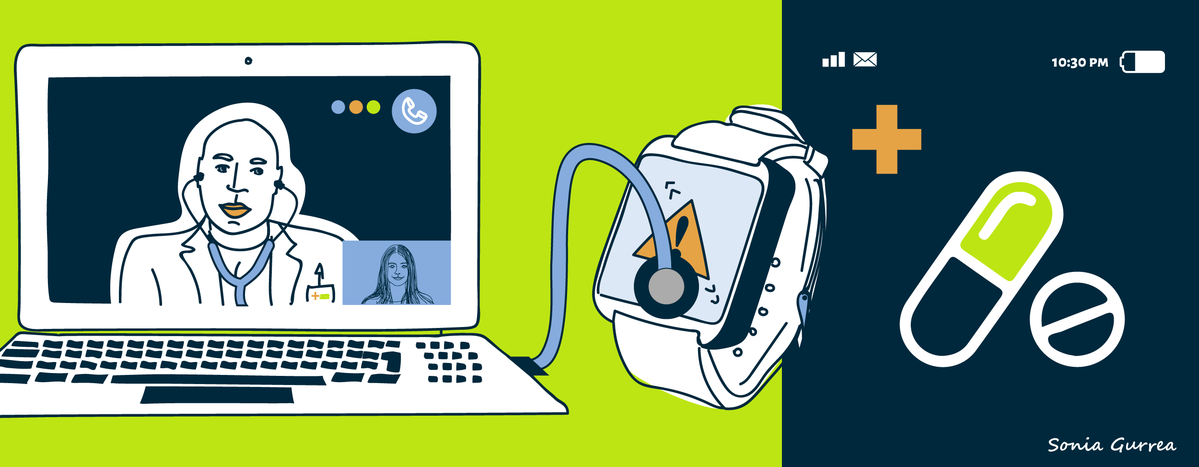
Smartphones and smartwatches: the medical tools of the future?
Published on
Translation by:
Charlotte WalmsleyThe portable health industry is becoming more and more fashionable. Yes, your fitness tracker can tell you how much you toss and turn in bed at night, but it is so much more than that. There are applications that can even predict when you will have a migraine. Can these watches and apps really improve our health, or is it just a fad?
First, it was a colleague that bought one, then a neighbour and now you. Smartwatches are becoming a tool of the masses. In 2018, 45 million were sold worldwide. Half of these sales were for Apple Watches.
Tech giants are now trying their hand at the health market. As well as accessing data on your sleep patterns and physical activity, since last year Apple users can also peruse their entire medical history on the ‘Health Records’ application, thanks to agreements with many hospitals.
Similarly, Google has specialised in the use of artificial intelligence in healthcare. One of its companies, DeepMind, launched an app in 2017 that warned doctors and nurses in hospitals in the UK if a patient needed urgent care. “We believe that artificial intelligence will transform healthcare,” Google claims on its official AI page.
To maximise the potential of this new technology, the best thing to do is team up with your doctor, according to Blanca Usoz, a family doctor from Bilbao who has been practising “collaborative medicine” for 8 years. She believes that the patient and doctor should work together as a team to manage health and illness.
Although she does not use smart watches during appointments, doctor Usoz has no qualms offering links with useful information for the patient or applications that can help them manage their health, for example, if a patient has a mole that is worrying them. “It’s a lot better than a consultation with Doctor Google, which can provide results that are not very good and that are not very reassuring,” she explains.
She also responds to patient’s concerns by email and offers video chats very often. If a patient needs a check-up that does not require an examination, why make them come all the way to the health centre? “These are tools that do not replace GP appointments, but they help to complement them and they do come with advantages,” she explains.
Her patients seem to be delighted with the care they receive. In 2014, doctor Usoz won the Spanish award for the most highly rated doctor on Doctoralia, a platform which allows you to rate your appointments with specialists. Yes, much like you would rate a restaurant. In 2018, she won third place nationally and has been a finalist previously as well.
Maybe the internet and connected devices are becoming the best healthcare assistants a doctor could dream of?
In 500 metres, prepare yourself for a migraine
Brainguard is an example of this technological revolution: it is an app that is able to predict a migraine 25 minutes before it hits, with an accuracy rate of 76%. In order to make its predictions, the app uses AI techniques to create a personalised model of the patient, based on their vital statistics, such as body temperature, heart rate, skin temperature, blood oxygenation and perspiration.
If a person knows that they are going to suffer from a migraine, “They are able to control their illness”, explains Jose L. Ayala, the creator of Brainguard, an offshoot from research conducted at Complutense University in Madrid. “For example, you can decide not to drive or not to go out and pick up your children from school.”
Controlling migraines also avoids the risk of overmedication. “Patients only take medication when they are experiencing symptoms,” explains Ayala. “This creates what we call a “hangover”, a vicious cycle. The more pain relief you take, the worse the pain becomes, which is known as a rebound headache.”
As medication for migraines takes about 10 to 15 minutes to take effect, with Brainguard, patients can avoid the pain completely. In clinical trials they have run in various hospitals across Madrid, Ayala and his team have managed to entirely stop the migraine in its tracks for two-thirds of patients and reduce symptoms for half of the others.
This could change the lives of the more than 4.5 million people who suffer migraines in *Spain8, particularly as 1 million of these suffer chronic migraines.
Ayala and his colleagues hope to launch the app at the end of the year or the beginning of the next. At the moment, they continue to refine their algorithm with further clinical trials and are developing a prototype for a wristband or smartwatch to measure the patient’s vital stats.
I haven’t heard you take your pill from the pack, can you check?
You are relaxing and sipping an expensive coffee in a fashionable restaurant, absent-mindedly flicking through Instagram, when suddenly, a worrying thought crosses your mind.“Have I taken my pill today?!” This scenario formed the basis of the Popit campaign, a device that sends notifications to your smartphone if you have forgotten to take your pill.
It’s not a simple reminder-style app. The app sends across warnings from Popit Sense, a device that clips onto the blister pack. Thanks to a microphone, an accelerometer and a touch sensor, the device can ‘hear’ and ‘feel’ if a tablet has been removed from the packaging. If the patient forgets, the application sends a notification to their smartphone.
It may seem surprising that a device reminding people to take their medication is aimed at the youth market, but this is because young people tend to be the worst at tracking their medication. “Older people already have a routine. The fewer pills you take, the worse you are at taking them properly,” explains Timo Heikkilä, co-founder of Popit.
To date, Popit has managed to reduce the number of forgotten pills by 81% according to its creators. “What we’re most often asked is why someone did not invent this technology before. _"People see it as an intuitive invention that fits into their lives,” explains Heikkilä. It has been available for sale online for a year now and can be used to remind people to take pills for all types of illnesses and not just the contraceptive pill.
The tendency of people to not complete a full course of medication is a “large-scale problem”, according to the World Health Organization. As well as contributing to 200,000 premature deaths each year in Europe, it is estimated that the people failing to complete the full course of their medication costs 125 million euros annually, caused by the costs of avoidable medical interventions.
A disclaimer in small font
Let’s not get carried away with the optimism though. There are risks. Every time we speak to our doctor via messaging apps and every time our smartwatch sends our vital stats to a cloud-based service, we are sharing valuable personal information.
Marco Lozano, an expert at the *Spanish National Institute for Cybersecurity (INCIBE)8, suggests that SMEs follow certain data security protocols, such as mechanisms to anonymise data and the use of ‘end-to-end’ data encryption from a customer’s mobile to the processing system of the service provider.
Despite these precautions, INCIBE had to resolve more than 123,000 incidents in 2017. ">Yes, data attacks are multiplying because we use more and more devices, but “users are the cause of between 80 and 85% of security incidents, either intentionally or by accident>,” explains Lozano. To this day, people continue to share their passwords on the internet. “If someone then uses that information to blackmail them, whose fault is it?”
But, how can we control what companies do with data on our sleeping habits? “Before using a device, we have to carefully read the terms of use,” recommends Marco Lozano. For example, fitness trackers “generate a huge amount of data and as users, we are not aware of what it is all used for.”
Such fears have recently been realised. Last year, alarm bells rang when Google decided to absorb data from DeepMind, its British AI subsidiary. Many claimed that the company had betrayed their patient's trust. People feared that Google could access the medical information of 1.6 million people and use it to provide targeted ads or even use them in other sectors, such as life insurance. DeepMind came out in its defense, claiming that patient's data would remain strictly under the control of the NHS. The seed of doubt had already been sown, however.
Our smartphones are quickly becoming the best healthcare assistants that a doctor could dream of. They can even go as far as predicting illnesses before they occur. However, maybe we need to think twice about sharing such precious information, like the speed of our heart beat, and who we share it with.
Illustration : © Sonia Gurrea

This article is part of a partnership with Mutualité Française about healthcare issues in Europe. The series is called Cheers. The idea? To discuss social healthcare in an engaging and interesting manner with young people in Europe.
Translated from Relojes y móviles inteligentes: bienvenidos a la salud del futuro



